#Rhodri
Text


Rhodri's personality feels a lot more concrete after have these two main AUs to work with (Space AU and Witch AU) For a LONG while, he's felt like he's missed a few things that made him feel like an established character. Which... honestly, due to the fact he's changed so much over the last ...7 years? it's been pretty crazy how many changes have actually happened lol.
Due to his upbringings in both AUs, Rhodri is a bit like his surrogate dad, Redland. They're both very abrasive people who value strength in others. Rhodri may have a short fuse for different things, but he's ultimately the type of person that expresses a fearlessness not found in many of his peers. He's hardheaded, not afraid of conflict of any kind but can be rather reckless if not restrained. He's huge on music, loves collecting different kinds of shoes and is easily flustered when around hot dudes. One unfortunate trait he got from Redland is having a difficult time in social situations of not readin the room. Redland is more so just blunt and has very little space to care for people outside of his family whereas, Rhodri just struggles with people in general (from poor socialization in his early yrs thanks to Redland's helicopter parenting lol). He can be blunt and say things that make others upset without meaning to, and may not take advice willingly even if it would help him. He's a good boy, but struggles to show it with how bold n brash his nature tends to be. Dude loves to fight so uh... if he smells that shit comin, runnn.
I've also implemented some Saber boys in this au owo We got Teddy(sex witch), Noel (Kitchen witch) and Ian (Striker witch; which just means his magic is used in physical fights). They don't have the BIGGEST spotlight but Ian and rhodri do have a thing >W>
#Rhodri#Teddy#Noel#Ian#Witch AU#ocs#Rhodri n Ian is like my new otp#it gets me goin man#i am alive when i think about them lol
57 notes
·
View notes
Text

(Reposted from DA, artist last active in 2013)
Artist: LadyAzalea
Date of Origin: March 21 2012
4 notes
·
View notes
Photo

What is dnd endgame if not gay marriage
33 notes
·
View notes
Text





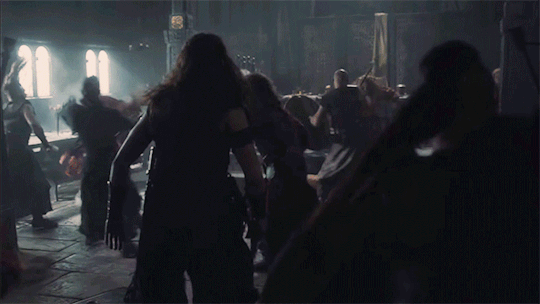








Sigtryggr Ivarrsson (+Rhodri & Brida)
Eysteinn Sigurðarson (+Nigel Lindsay & Emily Cox)
The Last Kingdom
Season 4, Episode 7
#the last kingdom#tlk gifs#sigtryggr#eysteinn sigurðarson#rhodri#nigel lindsay#brida#emily cox#mine: ps
11 notes
·
View notes
Text

Lil attack of Rhodri for @songteller on art fight!
#you commenting that he was hot made my day nkjfdsngjnh#all I ever wanted as an artist was to be able to draw characters hot I AM FINALLY ACCOMPLISHED#artfight#artfight 2023#rhodri#songteller
3 notes
·
View notes
Text

Have a drink... or two... or three
My OCs enjoy the evening in a tavern instead of hunting tricksters 😆
Vilkas (left) and Iain (auburn-haired behind the table) follow the card game attentively.
While Kjell clearly enjoys watching Alasdair lose, Rhodri sleeps through the rest of the evening.
Niven (middle), as usual, is not interested in any distractions and tries in vain to get the rest of the group to follow their mission.
As the only woman, Lias makes the men look pretty old and has even beaten Skeld at gambling.
For the time being, Skeld only pursues his two other vices: smoking and drinking.
Ciaran, the masked nheirya (a cat-like large predator) is satisfied with a simple bone.
Meanwhile, a companion of Levin (foreground right) notes that Levins ex-girlfriend (Lias) is also present.
Tigreal (right in the background) stays in the shadows as usual. And noone ever knows what he is up to
#digital art#tricksters#vilkas#rhodri#kjell#alasdair#lias#niven#skeld#levin#tigreal#Ciaran#tavern#fantasy#art#iain
12 notes
·
View notes
Text

Anthony Fineran (B 1981), Olive Zan Rhodri, 2023
1 note
·
View note
Text



HOUSE OF THE DRAGON 1x03 'Second of His Name'
#otto hightower#rhys ifans#hobert hightower#steffan rhodri#house of the dragon#hotdedit#*#welighttheway
196 notes
·
View notes
Text

I have no excuse for this.
Please enjoy.
#emmermods#rhodry vance#korpokkur#ffxiv mods#critter tag#IT IS WHAT IT IS#AND IT IS VERY GOOD & IMPORTANT
94 notes
·
View notes
Text
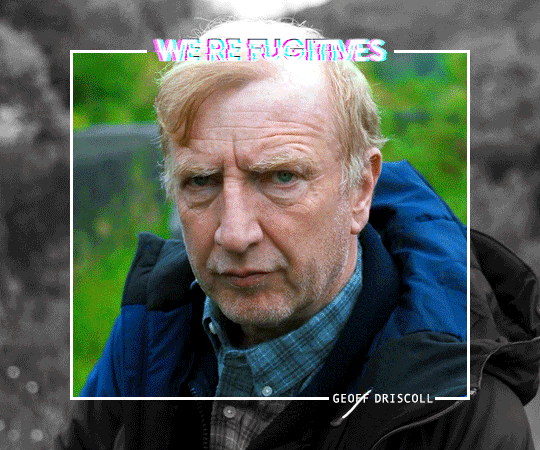


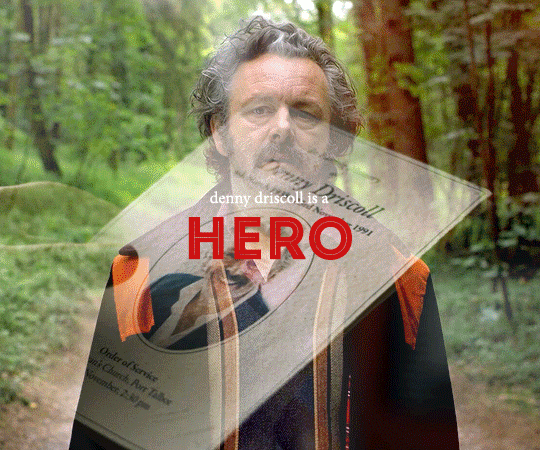
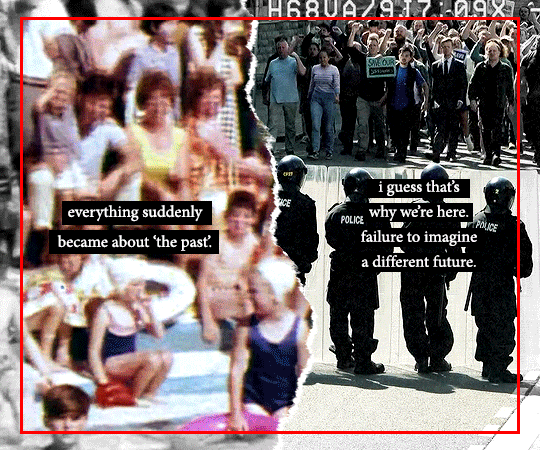


THE WAY (2024)
created by Michael Sheen, James Graham & Adam Curtis
#the way#bbc the way#michael sheen#steffan rhodri#mali harries#sophie melville#callum scott howells#gif#michaelsheenedit#too much effort for a show no one watched#just wanted to make something and have some of the vibes of the show#flashing cw
65 notes
·
View notes
Text
Dust, Volume 10, Number 7

Obsessed with Congo Funk in this month's dust
Without getting too deep into American electoral politics, let’s just say that we’ve been distracted lately. We’ve been mired in the slough of despair, frantic in our bargaining with god and lately, a feeling fresh breeze of optimism—it’s been so long, we hardly recognized it. But despite all that, the records keep coming, and we do our best to deal with them, not always with a fulsome 300-400 word review, but sometimes briefly, as here, in another edition of Dust. This month, we cover the run of it, from fictional characters that somehow participate in bands, to guitarists on synth holiday to vintage Swedish death metal reissued and more. Participants this time out include Jennifer Kelly, Byron Hayes, Bill Meyer, Jonathan Shaw, Christian Carey, Andrew Forell, Roz Milner and Ian Mathers.
Apifera — Keep the Outside Open (Stones Throw)
Four Israeli jazzmen take a jaunt through psychedelic rock and prog, incorporating trippy vocals and squalling synth runs into a space-age fusion. The musicians— Nitai Hershkovits on keyboards, the beatmaker (and evident link to Stones Throw) Yuvi Havkin, drummer Amir Bresler and guitarist Yonatan Albalak—have spent their careers crossing jazz with funk, hip hop and rock. Here they push it even further with vocal tracks that hardly sound like jazz at all. Trippy “Iris Is Neil,” for instance, delivers the title phrase in a keening vocal chant, as explosions of percussion go off like firecrackers on a string. Squiggles of synth, arcs of electric guitar reach for the epic, but in a manner more like Yes or ELP than Return to Forever. “Lucky Zoe” delves further into psychedelic pop, its wavery keyboards framing fanciful whimsies a la “Lucy in the Sky.” “Theodor Marmalade” thumps a funky beat behind flourishes of keys and vocal narratives about desert fauna. “Don’t you want to see the floating lights?” the cut inquires, and yes, I can just about make out strange, glowing objects in the sky. The instrumental pieces have a more conventionally jazzy feel; “I Love ECM” makes it case with light-fingered syncopations on rims and cymbals, liquid loops of bass and ice-chilled runs of electric keyboard. “Sera Sam,” at the end, brings on the trumpeter Avishai Cohen for a lyrical turn.
Jennifer Kelly
Majesty Crush — Butterflies Don’t Go Away
(Numero Group)
Butterflies Don't Go Away by Majesty Crush
A double LP or digital download from Detroit’s own Majesty Crush, the motor city’s answer to the sounds coming out on 4AD. With dreamy vocals by David Stroughter about being an obsessive fan or about bad relationships and a rhythm section kicking up a swirl of noise around him, Majesty Crush brings to mind about a dozen English bands without feeling particularly in debt to any specific group. Occasionally the guitar makes a really cool, almost crunchy sound, but mostly the music moves in the fog, blanketing the vocals in layers of distortion. They lack the fey lyricism of the Cocteau Twins or the dreamy harmonies of Lush but guitarist Michel Segal holds his own against Kevin Shields’s sheets of sound. Meanwhile, they invoke David Hinckley on “No. 1 Fan,” wake up with a bottle and a cigar in hand on “Brand” and dip into ambient spaces on three small interludes. The first half is made of their lone album Love 15, while sides three and four contain an early EP and singles, putting pretty much their entire catalog into one handy set. These Detroit guys seem unjustly forgotten, but thankfully Numero’s made their music easy to find.
Roz Milner
Dennis Callaci & Heimito Künst — First Light (Pass Without Trace)
Heimito Künst is one of many characters in Chilean novelist Roberto Bolaño’s The Savage Detectives, a tangled multi-narrative epic. The enigmatic Italian musician who produced the sounds underpinning First Light has adopted Heimito Künst as his pseudonym, likely in reference to the knotty soundscapes he builds from organs, synths and field recordings. On paper, Dennis Callaci’s lyrics and vocals seem like an odd pairing for Künst’s oblique audio collages. Callaci is half of the long-running lo-fi pop project Refrigerator and has helmed the Shrimper label for over three decades. His signature mid-range nasal utterances, more spoken than sung, populate the extraterrestrial ecosystems of Künst like strange seedlings peeping up from beneath loamy soil. First Light serves as a bridge between the mysterious and the familiar, another worthy entry in Callaci’s discography and a port of entry into an unknown artist’s body of work.
Bryon Hayes
Buck Curran — The Long Distance (Eiderdown/Obsolete)
Buck Curran is a guitar devotee. He’s a fluent player, a custodian of historic instruments, a chronicler of esteemed players and a compiler of albums that pay tribute to others. But sometimes a guy just needs a change of pace; enter The Long Distance. Mostly competed in a single night, it’s Curran’s holiday from the guitar. Instead, he plays analog synthesizer, layering sweeping tones and helicopter-rotor cadences into something rather like a lost Tangerine Dream album. Curran explains in the album notes that each piece is connected to a memory of a person or place, which may explain the melodies’ intimations of yearning and melancholy. But if you’re not Curran, they might evoke other associations; this music could easily be repurposed for film soundtracks.
Bill Meyer
Rhodri Davies — Telyn Wrachïod (Amgen)
Back in the mid-20th century, kids motorized their bikes with clothes pins and playing cards. The customization might not have yielded much additional propulsion, but the sound was cool. It turns out that they were simply following in the footsteps of 16th century Welsh harpists, who attached brays (slips of wood) to their strings to get a loud, buzzing sound. Rhodri Davies has explored the harp’s options in all manner of settings — Fluxus happenings, minimalist compositions, rock bands, free improv ensembles, the list goes on. Recently he’s commissioned speculative recreations of instruments from centuries ago, which he then uses to play the sort of short, wheels-within-wheels pieces that he formerly played with instruments amplified to a Konono No. 1-level of distortion. On Telyn Wrachïod he turns to the bray harp, which sounds rather like a cross between a banjo and a sitar. Each of its 12 tracks is spiky but so engrossing that you might find yourself hitting repeat a few times before you move on to the next one.
Bill Meyer
Desultory — Darkness Falls (The Early Years) (Darkness Shall Rise)
The repackaging and re-release of underground metal’s extensive archive of hyper-obscure demos and records continues apace. Darkness Falls (The Early Years) collects three demos from Swedish death metal outfit Desultory, originally independently issued on cassettes between 1990 and 1992. The record’s principal interest is its documentation of the sonic flexibility that informed the term “death metal” in the early 1990s; there’s just as much lightning thrash in these songs as there is moldering morbidity, especially the four engaging tracks on the band’s first demo, From Beyond (1990). The title track is especially pleasurable, in its sprinting, bludgeoning fashion — and this reviewer notes the added benefit of the title’s reference to an excellent H. P. Lovecraft story (is that you, Cthulhu?). Swedeath completists take heed. For the rest of us, it’s a fun release, and of some historical interest. Its relative necessity is open to debate — but hey, we didn’t really need that reissue version of Pig Destroyer’s Painter of Dead Girls on “black ice with metallic silver glitter” vinyl, either. Maybe Darkness Shall Rise should get some points for only releasing four different product versions of Darkness Falls….
Jonathan Shaw
Devouring the Guilt — Not To Want To Say (Kettle Hole)
Devouring The Guilt is a Chicago-associated (meaning two members live there and one moved away but remains connected) improvising trio. The line-up is pretty classic — Gerrit Hatcher on tenor sax, Eli Namay on bass, Bill Harris on drums. And so are the trio’s roots. Hatcher summons a burly tone, steers mostly clear of extended techniques, and gives occasional nods to free jazz heroes like Archie Shepp, Frank Wright and Frank Lowe. These familiar parameters establish a framework to display their collective originality, which lies in the personal vernacular they’ve fashioned. Namay is an alternately pithy and seething presence, plucking spare, structure-defining figures or bowing a maelstrom of woody sound. Harris pushes back against expectations that the drums should push the music forward by punctuating his clearly articulated attack with lots of negative space. Hatcher situates lyricism in long, understated tones and vigorously masticated phases, but also navigates unpredictably through the tight corners and sudden gaps that the other two set up.
Bill Meyer
Carol Genetti / Peter Maunu — Gleaners (Amalgam)
No matter how you approach it, Gleaners will stretch your mind. Just what are Carol Genetti (voice, electronics) and Peter Maunu (guitar, violin, mandolin) gleaning? Not other people’s music, that’s for sure. Maybe the languages of long-extinct species, confidences exchanged between dusty appliances that come to life after the staff leaves the thrift shop, ideas about what instruments might sound like if you see them in pictures. Even when Maunu resorts to rock-ish fuzztones or Genetti exhales an unspooling coo, their co-creations are resolutely sui generis. Their partnership has been honed through years of regular performance, often with other Chicago-based musicians, which likely explains the brisk confidence that this resolutely abstract music exudes. Genetti is a ceramic artist as well as a musician, and the physical manifestation of this album comes in two forms. She made ten one-of-a-kind clay cases that you can mount on a wall; the regular CDs come in a folio adorned with close-ups of the art edition.
Bill Meyer
Dave Douglas — GIFTS (Greenleaf Music)
GIFTS by Dave Douglas
With sizzling guitar lines and a frontline horn duo of Douglas and James Brandon Lewis, you’d think it would be easy for this to be a mere blowing session. But it’s not. The music is frequently introspective and has a very ECM kind of ambience: it has this wide-angle sonic clarity where each instrument has room to breathe and let their notes slowly linger. The suite of Strayhorn songs in the middle doesn’t feel tired, either. Rafiq Bhatia’s chugging guitar keeps “Take the A Train” moving while Douglas and Lewis move in sync for the theme. When they stretch out, they’re sometimes playing against each other but always seem like they’re on the same page. Meanwhile Bhatia’s playing draws on Bill Frisell, making up for the lack of a low end with well-placed chords and sonic textures. These four make the music their own and it’s one of the year's most rewarding jazz records.
Roz Milner
Samara Lubelski & Marcia Bassett — Indexical/Rhizome (Relative Pitch)
Samara Lubelski and Marcia Bassett are both well-established members of the U.S. scene that engendered the moniker “new weird America” back in the early aughts. Both have CVs that stretch on for miles. Lubelski is best known as a star in the MV&EE solar system, while Bassett churns out murkier sound pools in a variety of projects, such as Double Leopards and Hototogisu. The pair have a long-standing partnership unfurling phosphorescent drone webs through guitar and violin. This is their eighth recording, and it presents two extended string seances that coax electric spirit whisps from unseen worlds. “Indexical” is the lengthier of the pair and features zoned out but controlled guitar howl from Bassett alongside Lubelski’s rapid bowing. The undulations intertwine to become a radiant lattice of sound. Alien timbres infect “Rhizome,” which sways between a noise-drone wall of sound and hushed electronic whispers. Both are live recordings, showing off the raw magic that this pair of string sirens can conjure.
Bryon Hayes
Joe McPhee With Ken Vandermark — Musings Of A Bahamian Son (Corbett Vs. Dempsey)
Joe McPhee’s been toting folders full of poems and brief musings to gigs for years, but in recent years they’ve assumed an increasingly prominent place in his performances. Now, he’s finally put 28 of them on record, punctuated with nine short soprano sax/clarinet interludes that he improvised with Ken Vandermark. Oppression gets defied, history acknowledged, but most of all, love gets its due. McPhee muses about folks from the neighborhood, jazz heroes that inspired him, old friends now gone, and the balm and galvanization imparted by music itself. Abstract but tender, the interludes amplify this sentiment, showing by example how much appreciation for life and fellowship can be invested in a few tones.
Bill Meyer
Kate Nash — 9 Sad Symphonies (Kill Rock Stars)
youtube
On 9 Sad Symphonies, Kate Nash leans into her musical theater background, with skillfully crafted arrangements that incorporate classical orchestrations reminiscent of the film musicals from the 1930s-1950s. As on most of her albums, she tweaks her sound and musical partners, here working with producer Frederik Thaae. There is a sauciness to her lyrics, which even go so far as describing lunch breaks in toilets. All is not a lark. Nash seeks to exorcize personal demons on “Vampyre” and “My Bile '' is a bracing assessment of a broken relationship. 9 Sad Symphonies may have a bucolic surface, but the singer-songwriter ventures down dark pathways where stars of the Silver Screen would have likely feared to go.
Christian Carey
Occulta Veritas — Irreducible Fear of the Sublime (I, Voidhanger)
Occulta Veritas plays an avant-garde variety of black metal, long on complexity and idiosyncratic compositional sensibilities. It’s abrasive and disorienting, and not especially fun to listen to — which yes, that’s the point, but there’s a huge amount of this sort of thing circulating through the metal underground at any given point, and deliberately distancing music from listeners’ parameters for pleasure can be a tough prospect in that oversaturated context. For this reviewer, the record’s engagement with the theoretical concepts of Jacques Lacan (big-deal psychoanalyst, post-structural Daddy and important player in France’s academic politics of the mid-20th century) helps Irreducible Fear of the Sublime stand out. It’s pretty great that one of the songs is called “Metonimia,” since Lacan’s projection of metonymy along a diachronic axis of spatio-temporal relations fits the music’s tortured snarls and chaotic, off-kilter arrangements. The utterances want to go somewhere, but the structures those utterances are trapped in make meaningful progress a near impossibility. It would be even better to have a lyric sheet, to get more than just the tantalizing engagements with Lacan provided in song titles (“The Mirror Stage,” “Bound to Incompleteness” and so on). There’s an overheated quality to the record that’s additionally compelling: This is your brain; this is your brain on Lacan. But it would be useful to know what specific ideas accompany specific sounds and turns in the music’s syntax. Or is it all just sound and fury, signifying nothing?
Jonathan Shaw
J. Pavone String Ensemble
Reverse Bloom by Jessica Pavone
The current edition of Jessia Pavone’s String Ensemble is reduced to essentials. There are just three players including Pavone, who plays viola, Aimée Niemann on violin, and Abby Swidler switching between those two instruments. The language is likewise paired down on Reverse Bloom. The first two pieces (of four) emphasize long tones that hiss and sigh at a deliberate pace, evoking an uneasy state. “Obstructed Current” pushes against the prevailing vibe with jolting, energetic phrases that move joltingly out of synch. The closing piece, “Embers Slumber,” likewise explores contrasting elements, which resolve by settling into a deliberate, belly-breathing rhythm. The album charts a course towards a grounded state that’s not so much a happy ending as a sonic enactment of the honest word that gets you through.
Bill Meyer
Keith Rowe / Gerard Lebik — Dry Mountain (Inexhaustible Editions)
Dry Mountain by Keith Rowe / Gerard Lebik
Despite having his name on the spine, Keith Rowe did not play on this record. However, he did originate the process of sound (re)imagining that it presents, and his cover image of a wiggling digit raises the question — how deep does a fingerprint go? The score of Dry Mountain originated from the imprint Rowe’s gear left on a sheet of paper. Rowe and Gerard Lebik interpreted that score and then handed a recording of their performance to three visual artists, who created their own scores based on what they heard. These scores were then played by the group of electronics, string, and percussion players heard on this album while listeners drew responses to the music, which they then handed to the musicians, who played them on the spot. The further you get from the first piece heard, the further the music gets from Rowe’s sound world; in a reversal of Alvin Lucier’s I Am Sitting In A Room, the music gets segmented and defined.
Bill Meyer
D. Sablu — No True Silence (Yes We Cannibal)
No True Silence by D.SABLU
D. Sablu is a New Orleans punk lifer, late of Casual Burns and Feverish, but forced (or inspired or motivated) by COVID to strike out on his own. No True Silence is Sablu’s first full-length, and it’s a killer, a slaughterhouse frenzy of punk /garage/ hardcore and a little metal, all chopped up with chainsaws and spraying all over the walls. Indeed, you’ll have to stand well back from the player when you first put the record on, because it leads with “Bomber Stomp,” a two-minute assault of lumbering, heavy punk that sways noticeably as it comes down on the ones and twos. Sablu lets off a howl near the end that raises the hairs on my neck, because it’s so sulfurous and tortured. “69 Forever” lights a new wave hook on fire with a blowtorch; it’s catchy as hell but blows you back with sheer volume and aggression. The brief “World Peace” is pure, adrenalized chaos, drums galloping wildly, guitars flaring, bass buzzing and Sablu screaming “World pee-eeea-eace!” like a banshee. Fun stuff. Turn it up.
Jennifer Kelly
Mark Sims — Take Me Faster (Carousel Horse Records, Old 3-C Label Group, Anyway)
Take Me Faster by Mark Sims
Deindustrialization has hollowed out the Midwest’s economy, leaving shuttered factories and empty main streets all across the central American states. Mark Sims, a bricklayer when he’s not performing, sings with the soft, wry melancholy of a man left behind by tectonic shifts, finding solace in well-turned melodies and plain-spoken turns of phrase. It was fashionable half a decade ago to interview Ohioans in diners about their economic circumstances; Take Me Faster provides the same sort of snapshot of dislocation and disappearing opportunity.
For instance, in “Hold On To Me,” the narrator is driving long-distance to a job somewhere, trying to find a song on the radio and thinking about home. “Money comes and goes so quickly/I could work a million hours/and still be broke when I die,” Sims confides, against a radiant lattice of picking. The song is unassuming, and kind of perfect, a distillation of the struggle to stay connected and human in a low-wage high-uncertainty economy.
The songs are simply arranged, a mesh of Sims’ dusky, resonant voice and acoustic guitar, mostly, with a little synth in the background for texture. And yet, this is more than enough, as on the haunting “I’m Always by Your Side,” where Sims’ voice lifts up through the sadness, fluttering soulfully in the upper registers before drifting back to earth. These songs don’t pull any tricks or do any somersaults, but they’re satisfying all the same.
Jennifer Kelly
Jason Stein / Marilyn Crispell / Damon Smith / Adam Shead — Spi-raling Horn (Balance Point Acoustics/Irritable Mystic)
spi-raling horn by Jason Stein, Marilyn Crispell, Damon Smith, Adam Shead
The trio of Shead, Stein, and Smith first convened with the former two’s duo shared a bill with Smith. They recognized in each other a common aesthetic intent, a shared wish to improvise within a particular set of parameters; there’s no predetermined material, but a collective intention not to be confined to jazz. They’ve all listened closely to the great 20th century European free improvisers, and part of what they’ve taken from them is an intent to fashion their own language. There’s no soloing here, although occasionally someone will drop out if that’s what the music requires. And when they invite a fourth musician into the action, they participate as an equal contributor, not a featured guest. Marilyn Crispell’s associations with musicians as disparate as Barry Guy, Anthony Braxton and Joe Lovano reveal her to be an artist similarly concerned with fluent exchange, not ego-boosting display. But she’s also a stern bringer of velocity and complexity on this recording, which is the studio half of a single brief encounter which took place in Chicago in the middle of 2023. Dense assertion, abrasive texture, and bursting co-existence cohere into a seven-part sequence of collaborative invention.
Bill Meyer
SUSS — Birds & Beasts (Northern Spy)
Birds & Beasts by SUSS
Gorgeous hovering tones of pedal steel, guitar (with e bow), keyboards and synths coalesce in these cuts, each a glowing, vibrating meditation on the beauty and fragility of the natural world. SUSS, from New York City, explores many of the same haunted textures as Chuck Johnson and Pan*American, letting sustained notes linger in shimmering layers of slow-moving sound. “Overstory” encases picked acoustic notes in a translucent amber of pedal steel arcs and violin, letting the sound grow as slowly—and as enormously—as old growth forest. “Flight” follows a more pronounced rhythm than other cuts, its steady pulse of strumming beating like wings on a long trip south. The disc is not all sunshine, however. “Prey” lurks in ominous buzzes and hums of feedback, building threat into dark-toned dissonance and animal screeches into wails of guitar. The long closer, “Migration,” pulls taut with anticipation, its beat like a metronome, its melody unfurling in the wheeze of harmonica and the shifting twang of pedal steel. SUSS often gets tagged as cosmic country, but which country? Unearthly, luminous and beautiful.
Jennifer Kelly
Their Divine Nerve — Return of the Lamb (Staalplaat)
The Return of the Lamb by Their Divine Nerve
Dmytro Fedorenko and Jeff Surak have been collaborating for about 20 years now, but this first album as Their Divine Nerve appears to be the first time the self-described “Ukrainian-American noise duo” have collaborated on record at length. But right from the churning, thumping 14+ minute opener “The Infinity Book” here it’s clear that their long association has led to a certain sympatico comfort with each other. Whether on the more overtly aggressive shredding (not guitar riffs, actual shredding) of “Glowing Skulls” or the more pensive, droning likes of “Dignityphobia,” here the pair have arranged a rich, expansive (71 minutes on CD, plus about another half hour in bonus material on digital) feast for anyone looking to add some variety to their noise diet. By the time the CD thunders and shudders to a half with “Civilization Was Never Civilized” the listener may not know anything more about the titular lamb, but it’s clear its return is momentous indeed.
Ian Mathers
Various Artists — Congo Funk: Sound Madness From The Shores Of The Mighty Congo River (Kinshasa/Brazzaville 1969-1982) (Analog Africa)
Congo Funk! - Sound Madness From The Shores Of The Mighty Congo River (Kinshasa/Brazzaville 1969-1982) (Analog Africa No. 38) by Analog Africa
Mobutu Sese Seko was a murderous tyrant, but he changed African music forever when he invited James Brown to play Zaire 74, the three-day musical festival put on alongside George Forman and Muhammed Ali’s epic Rumble in the Jungle. American funk transformed an already vibrant musical scene like a chemical catalyst setting off an explosion of electrified, psychedelic soul in Kinshasa and Brazzaville. Congo Funk! collects 14 incendiary cuts from the 1970s and 1980s — culling from an original haul of over 2000 sounds — not a dud in the bunch and more than a couple of revelations. M.B.T’s eponymous “M.B.T.’s Sound” is one of the best on this two-disc set, all brassy swagger and intricate polyrhythmic percussion, as is Orchestre National du Congo’s full-throated celebration “Ah Congo!” with its wild call and response, feral sax play and unhinged drumming. Lolo et L'Orchestre O.K. Jazz’s “Lolo Soulfire,” sets up a Stax-like groove and lives in it, slouching and swaggering like Booker T in a fever. Fire.
Jennifer Kelly
Ricki Weidenhof — Church (We Be Friends)
Church by Ricki Weidenhof
A member of Pittsburgh avant-collagists Sneeze Awfull, Ricki Weidenhof examines a life of religious ambivalence and search for identity on their solo album Church. Working through a range of styles that illustrate and amplify those themes, Weidenhof produces an emotionally rich and sometimes challenging fractal mosaic. The wonderfully titled suite “Raptured in Formal Violence” contrasts liturgical solemnity and a babel of religious voices with jittering house to capture that mixture of dread and ecstasy the Church so often induces. At the other of the scale “Dreary Field” is an Arthur Russell inspired idyll of acoustic guitar and cello as Weidenhof singsof the past “I finished that game of hide and seek long ago/Only it was still at play/I remember the last place I had hidden.” “Extinction Meditation” begins in a similar vein, the religious and personal entwined with vivid imagery, before a chaos of multi-tracked vocals, distorted beats, and razor strings. A powerful, heartfelt record that deserves a wide audience.
Andrew Forell
Wormed — Omegon (Season of Mist)
OMEGON by Wormed
It’s hard to say anything meaningful about Wormed — pretty much everything about the band is absurd, or at least verging on it. To identify some key elements of the absurdity: the “vocals” of Jose Luis Rey Sanchez (appearing on Omegon, as always, under the appropriately throaty appellation Phlegeton — Sanchez is likely referring to the mythic river, but all I can think of is phlegm…), for whom the unappetizing term “throat fart” might have been coined; the sheer nuttiness of the band’s tech death wankery, which the band has actually moderated a wee bit for Omegon; the fact that Wormed have been at it since 1999, mostly developing a continuous narrative of a fictional cosmos, full of conflict among evil extraterrestrial forces, multiple timelines and a protagonist named Krigshu (some song titles from this record are indicative: “Aetheric Transdimensionalization,” “Gravitational Servo Matrix,” “Virtual Teratogensis”). You figure it out. Beyond the music — more tech than slam, but still seeking some sort of apotheosis of that quality death metal freaks name “brutality” — what’s most engaging about Wormed is the band’s ability to sustain the absurdity and to seem absolute serious about it. Maybe that makes the Spanish band especially well-suited to our times. Or maybe we just haven’t gotten the joke yet.
Jonathan Shaw
#dusted magazine#dust#apifera#jennifer kelly#dennis callaci#bryon hayes#buck curran#bill meyer#rhodri davies#desultory#jonathan shaw#devouring the guilt#carol genetti#samara lubelski#marcia bassett#joe mcphee#ken vandermark#kate nash#christian carey#occultus veritas#jessica pavone#keith rowe#gerard lebik#d. sablu#mark sims#jason stein#marilyn crispell#SUSS#their divine nerve#ian mathers
7 notes
·
View notes
Text

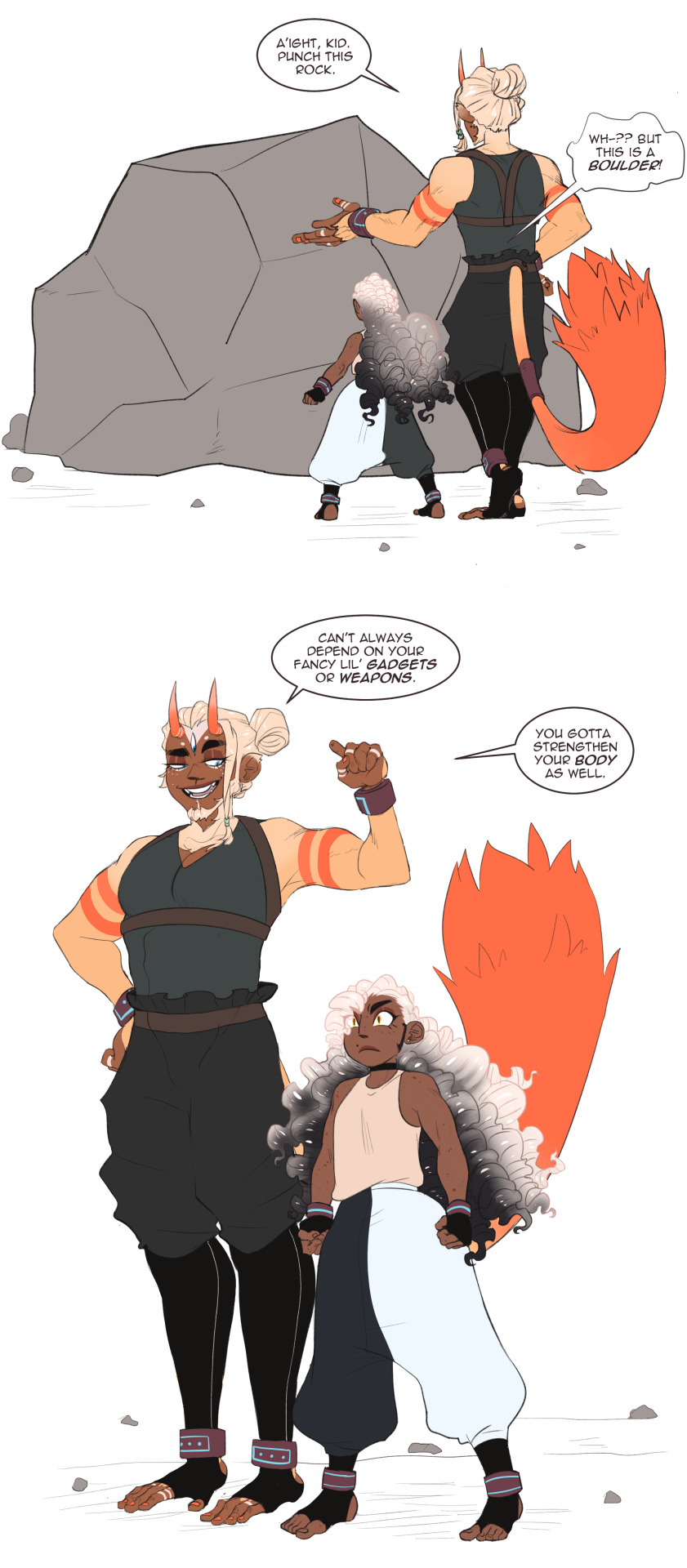
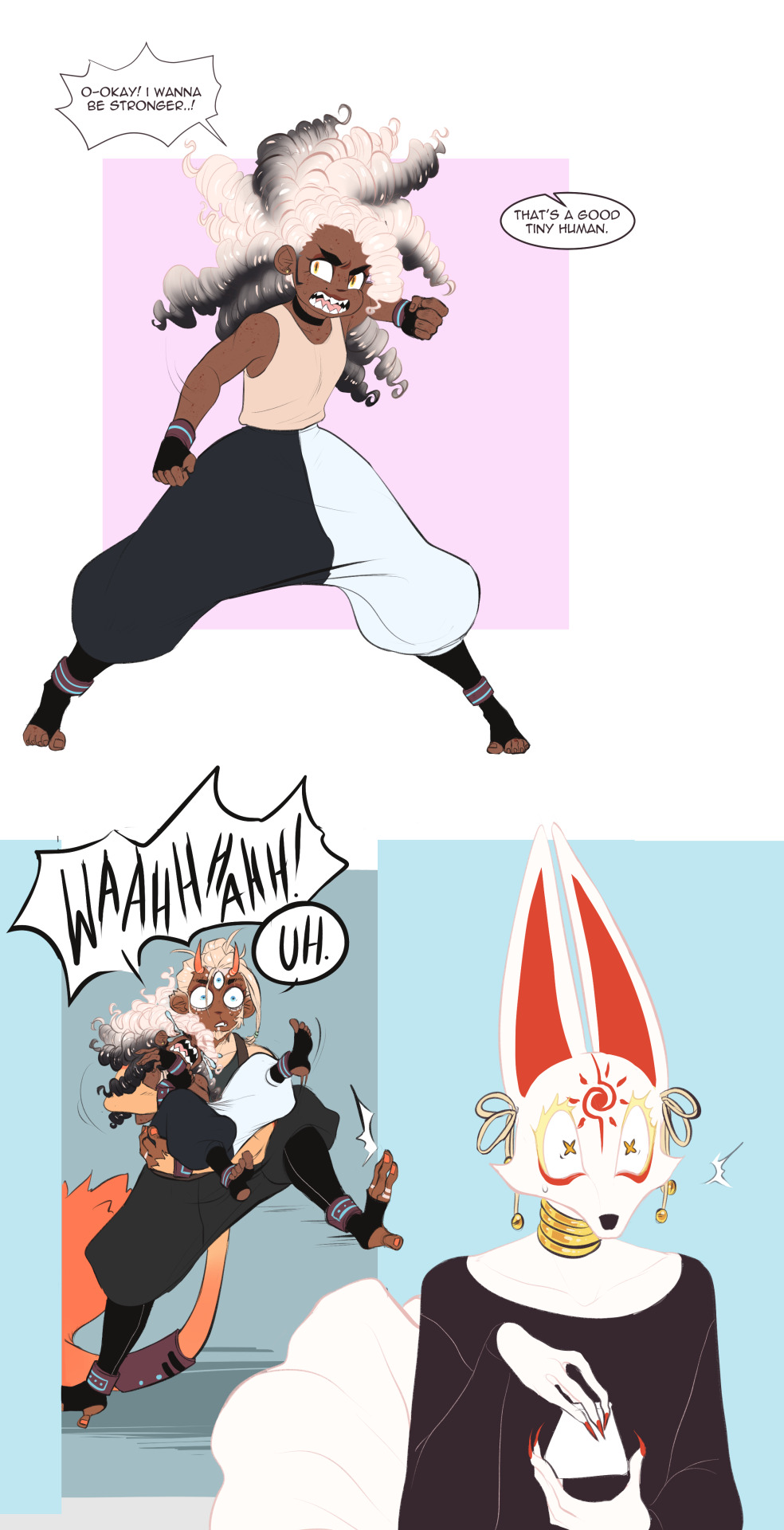
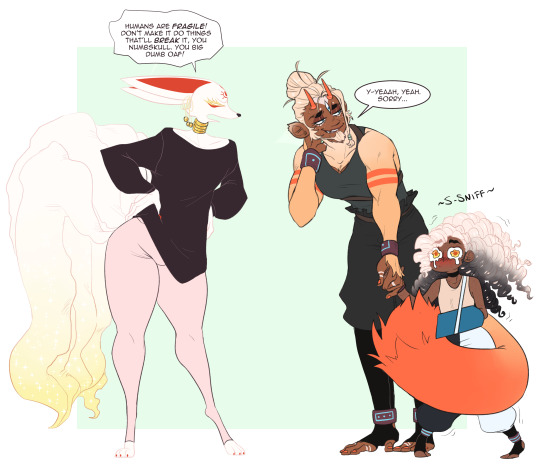
Some time ago, I made an adopt I had into this bulky monkey man named Redland. vwv He's a fun character of mine who is now Rhodri's surrogate dad in whatever AU i have for them. In this particular AU, they dwell in space as humans no longer have Earth to live on.
Redland ends up taking care of Rhodri over time and in this set, he tries to teach a very squishy and tiny human how to punch a solid ass surface that most definitely broke bones. Learning that humans are not made of metal is a lesson he and Rhodri learned the hard way, luckily, his longtime 'friend' Doc is able to scold him on what NOT to do with your own personal teen human.
#Redland#Doc#Rhodri#Space AU#ocs#Redland being a dad has legit helped me worldbuild#idk how to describe it other than#single dads get me goin#but also he's not really a single dad cuz doc is like#his non official boyfriend so its all good lol
57 notes
·
View notes
Text
youtube
11 notes
·
View notes
Photo




Dump of some older Rhodri stuff ft. witcher AU, dad moments, & backstory outfits
19 notes
·
View notes
Text










The Way (2024) Dir. Michael Sheen
#I very much enjoyed this. it was really well done and the characters were so much more fleshed out than I would have expected in a 3 epi arc#michael sheen#the way#michael sheen the way#the way 2024#Steffan Rhodri#welsh#wales#nikkirookgifs#othershows#suicide#tw: sucidal thoughts
10 notes
·
View notes
Photo
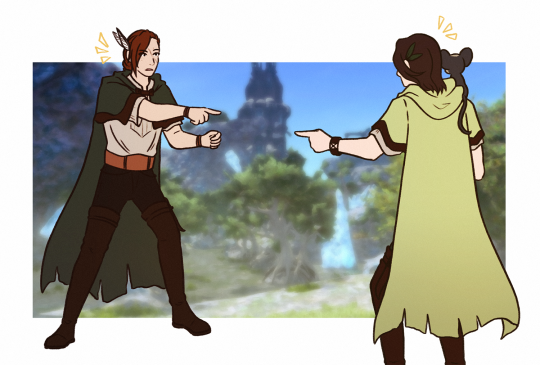
Well one of us is going to have to change...
🌿 Happy Birthday @aethernoise 🌿
#ffxiv#Hyur#Rhodry#Deryk#still the funniest thing to ever happen#just NPC that is Rhodry clone#Inspired by you getting the Boy through EW and actually TO his clone#Enjoy a meme#HAVE A GREAT BIRTHDAY EM!!#I hope u have a fantastic day!! ilu!!!#art: mine
59 notes
·
View notes